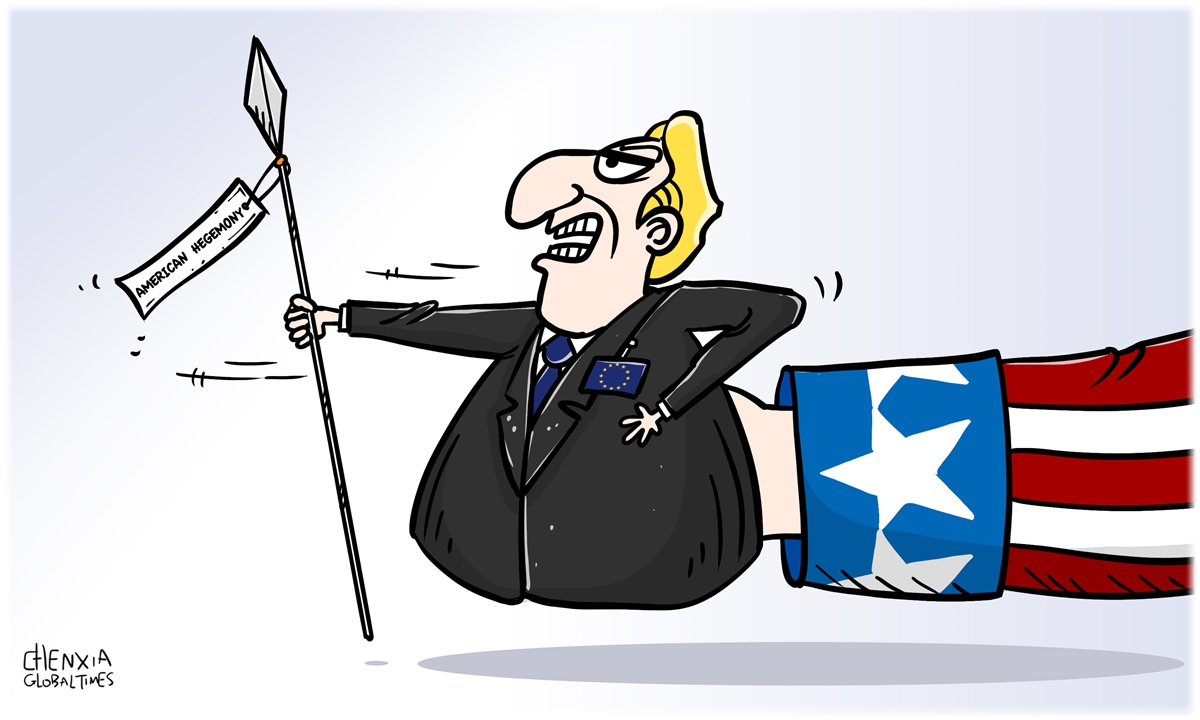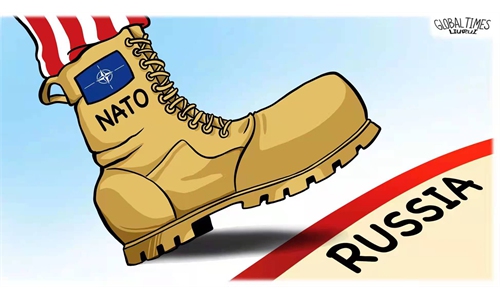
US hegemony Illustration: Chen Xia/GT
Monday marked the 73rd anniversary of the founding of NATO. This US-led bloc's repeated eastward expansion squeezed Russia's strategic space, which triggered Russia to launch a military operation toward Ukraine. Europe has been then dragged into plight. In seven decades, what has NATO brought to Europe?
For Europe, NATO has been a double-edged sword. Since the Cold War, NATO has provided Europe with security protection. But it has also created problems for the continent, such as a decline of its independence and the restriction of European integration.
Europe hopes NATO can play the role of a shield, while under the leadership of the US, NATO actually acts as a spear, an offensive tool for the US to maintain its regional and global hegemony. NATO wants to achieve its security through eastward expansion, but it has made Europe increasingly insecure. And many security problems encountered by Europe were created by the US. For example, the ongoing Russia-Ukraine conflict was actually provoked by Washington.
Europe's decades-long reliance on NATO for security has also resulted in a decline in its member states' defense capabilities. In exchange for US security protection, Europe has to compromise with the US on non-security issues, such as coordinating with Washington in exploiting NATO to interfere in the affairs of other countries or regions to safeguard US hegemony. Against this backdrop, many of their joint operations within NATO go against Europe's interests.
Europe's dependence on NATO is like taking painkillers. If Europe does not take such medicine, it will suffer from pains. But by taking painkillers, Europe will suffer more from the reliance or addiction to the medicine.
Kremlin spokesman Dmitry Peskov said on Saturday, "When the Europeans will sober up a little from the American bourbon, when they will finally realize that we must together care about the fates of our continent, of Europe, even Eurasia, then the time will come finally to reassess our relations and to enter the state of dialogue," according to Tass.
Peskov's line sounds very rational. Europe's mentality toward the US and NATO has always been contradictory. Europe's interests and strategic demands are different from those of Washington. If Europe blindly follows the US, it will not be in line with Europe's interests. Furthermore, whether it is the financial crisis or the Ukrainian crisis, it is the interest groups of the US that benefit in the end, including capital giants, military-industrial complexes and energy giants. Those suffering the loss have always been Europeans, who have to face problems such as soaring prices.
Within Europe, there are two schools, one pro-Atlantic and the other advocating strategic independence. Since US President Joe Biden took office, voices calling for strategic independence have become weaker. But the Russia-Ukraine crisis has made many Europeans realize that Biden is not much different from his predecessor Donald Trump - the one that suffers is Europe, as always. It is believed the crisis could awaken the Europeans. They should hold no illusion about the US and have a sense of urgency that security and peace are not granted but something they must fight for.
On March 21, the European Council formally approved the Strategic Compass, giving the EU an ambitious plan of action for strengthening its security and defense policy by 2030. The plan includes establishing a strong EU Rapid Deployment Capacity of up to 5,000 troops for different types of crises.
This plan is symbolic. Europe does not have enough ability to maintain its own security. Different member states have different military strengths. The ability of small- and medium-sized European countries in terms of military, supply, intelligence and command is limited. But at least, this plan is positive since it shows Europe has started to strive for independence and to seek peace and security with its own strength, despite the long road ahead.
Europe's dependence on the US and NATO is unlikely to change in the foreseeable future. Many member states are not confident that they themselves or major European powers can secure their security.
One obstacle that Europe faces to achieve strategic independence is its internal unity. Major countries like France and Germany have different security demands from those of smaller countries such as Poland and Romania. It is unrealistic to consolidate the defense abilities of these countries or even get rid of dependence on NATO at the current phase. Europe cannot achieve anything without unity.
The author is a professor at the School of International Relations of Beijing Foreign Studies University. opinion@globaltimes.com.cn

